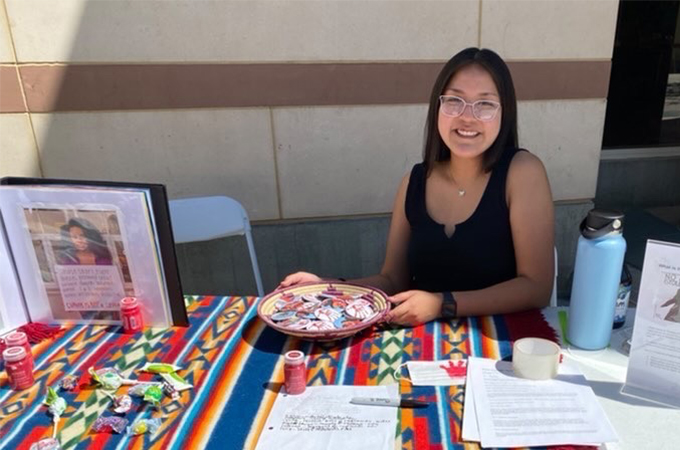“Indigenous women make up less than one percent of the population of the United States. They are murdered at more than 10 times the national average.” These are the first two sentences viewers see on the screen when watching Bring Her Home, a documentary that follows three Indigenous women as they fight to vindicate and honor their missing and murdered relatives.
University of Redlands Native Student Programs recently hosted a virtual screening and panel discussion that featured Twin Cities PBS Producer and Director Leya Hale, North Dakota State Representative Ruth Buffalo, and activist Mysti Babineau. All three women spoke about their experiences in the Missing and Murdered Indigenous Women (MMIW) movement and the making of the film.
“I really appreciated the focus that this film has on the voices of Native women,” said Nora Pulskamp, director of Native Student Programs and host of the event. “[These voices] are coming to the forefront in a lot of different fields. We see the influx of people who have been elected to office, in terms of Native representation, a lot of them have been Native women.”
In the documentary, Buffalo recalled her involvement in the 2017 search for Savanna LaFontaine-Greywind, a 22-year-old pregnant Native woman who went missing and was later found dead in Fargo, North Dakota. “Women are life givers, women sometimes run a household; they’re the glue of a family. Being from a matriarchal, matrilineal people, when a woman goes missing it completely ends the lifeline for a clan to continue,” Buffalo said.
In 2018, Buffalo was the first Native Democratic woman elected in the North Dakota Legislature and has served on advisory councils focused on women's health, women's leadership development, and local food systems. Much of her policy work focuses on advocating for Native people and the unique challenges they face. In Bring Her Home, she is filmed attending a MMIW march and rally that Babineau helped organize.
As the climate justice organizer at MN350, Babineau leads the Climate Majority Project and coordinates the policy action team. Her climate activism often intersects with the MMIW movement. When oil pipelines need repairs and construction workers temporarily move into communities around the structures, Native women often experience increased levels of sexual assault and harassment. In the documentary, Babineau is seen hosting local protests and demonstrations that bring awareness to these joint issues.
Artist Angela Two Stars, another Native woman whose own grandmother was kidnapped and killed, grappled with her creative process throughout the film. Historical factors, such as Native people being displaced from their land and separated from their Indigenous languages, influence her art. Toward the conclusion of the documentary, Two Stars curated an art exhibit that displayed works by Native artists while raising awareness of the MMIW movement.
“While this is something that happens to Native women, it’s not the only thing to know about Native women,” she said. “They’re strong and powerful and I wanted the show to exhibit that.”
Following the screening, Pulskamp moderated a discussion between Hale, Buffalo, Babineau and members of the University community. The three women spoke about their accomplishments, continuing to stay motivated as activists, and Native representation in media.
One participant asked Hale about the Native tradition of smudging—a ritual that purifies the body, aura, and energy of a ceremonial or personal space—that appears throughout the film. Hale said that she relied on her own cultural traditions to create a safe space for the documentary’s subjects to tell their stories.
“I felt a responsibility to raise awareness of this issue without sensationalizing it,” she said. “I wanted to focus on women who were leaders and had the strength and courage to use their voices to make change in their communities.”
Members of the Native American Student Union (NASU) thanked the event’s speakers and attendees for their participation. Leading up to the screening, NASU distributed information about the MMIW movement to passersby in Hunsaker Plaza to raise awareness on campus.
“We respect each of you for taking your culture, traditions, and identity and letting them guide you,” said Native American Student Union President Rebecca Aguirre Rios ’23. “It’s inspiring—you’re all different but you still let who you are come first.”
Learn more about Native Student Programs.






